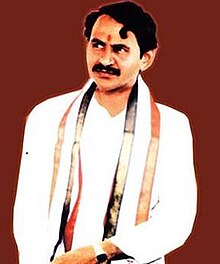Vangaveeti Mohana Ranga Rao | |
|---|---|
 | |
| Born | Vangaveeti Mohana Ranga Rao 4 July 1947 Katuru, Vuyyuru, Krishna district |
| Died | 26 December 1988 (aged 41) |
| Cause of death | Murder |
| Other names | Ranga |
| Occupation | Politician |
| Title | Member of the Legislative Assembly |
| Term | 1985–1988 |
| Predecessor | Adusumilli Jaiprakash Rao |
| Successor | Vangaveeti Ratna Kumari |
| Political party | Indian National Congress |
| Spouse | Ratnakumari |
| Children | 2 |
Vangaveeti Mohana Ranga Rao (4 July 1947 – 26 December 1988) was an Indian politician from Andhra Pradesh.[1] He represented Vijayawada East assembly constituency as a member of Indian National Congress.
Ranga's elder brother, Vangaveeti Radha Krishna Rao Sr., was associated with Chalasani Venkata Rathnam, secretary of the Communist Party of India, Vijayawada. However, conflicts arose between Venkata Rathnam and Vangaveeti Radha, to get a hold on Vijayawada transport business, dominated by Datti Kanaka Rao, a follower of Chalasani Venkata Rathnam. In 1972, both Kanaka Rao, and Venkata Rathnam were allegedly murdered by Vangaveeti Radha's supporters. These events in turn led to a retaliation by a rival group, ending in the murder of Vangaveeti Radha. Upon the death of Vangaveeti Radha, his brother Mohana Ranga took over the leadership of United independent Organization with the support of student union leaders Devineni Chandrasekhar (Gandhi), and Devineni Rajasekhar (Nehru).[2]
The power struggle between the politically powerful Mohana Ranga and the Devineni family led to the splitting of the United Independent Organization and to the alleged protracted murders of brothers Devineni Chandrasekhar (Gandhi) in 1979 and Devineni Murali in 1988.[1][2] Subsequently, while Ranga was staging an indefinite fast for distribution of land pattas to residents of Giripuram, he was attacked by a group of men allegedly belong to Devineni Rajasekhar (Nehru) attacked Mohana Ranga's camp and assassinated him in the early hours of 26 December 1988. Ranga's two assigned bodyguards did not intervene.[3][4] The murder led to large-scale riots in erstwhile Krishna, Guntur and the Godavari districts.[3]
- ^ a b "It all began at the auto stand". The New Indian Express. 22 June 2010. Archived from the original on 7 October 2016.
- ^ a b "Bid on ex-MLA's son: 4 held". The Hindu. 11 February 2004. Archived from the original on 26 December 2016.
- ^ a b Cite error: The named reference
violencewas invoked but never defined (see the help page). - ^ Jafri, Syed Amin (5 March 2002). "All 33 accused in V M Ranga Rao murder acquitted". Rediff.com.